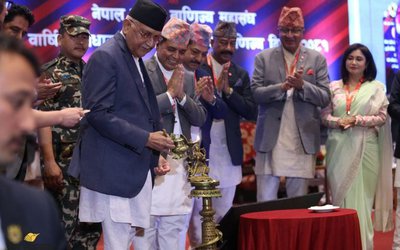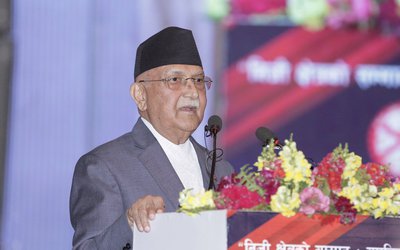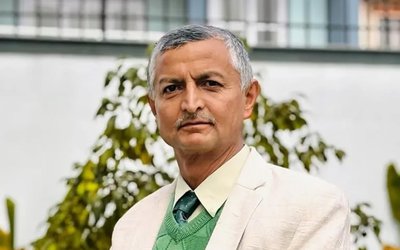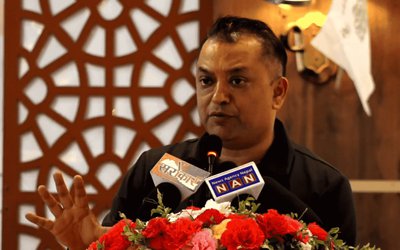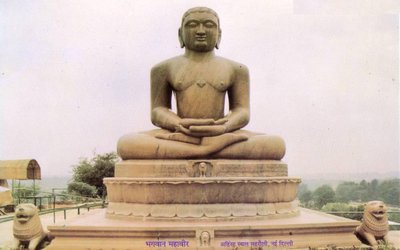
By Rajendra Mahato
Relations between Nepal and India are not limited to the formal relations that exist between the two capitals- Kathmandu and New Delhi. They have expanded at the peoples’ level. Nepal shares its boundary with India on three directions. Indian Prime Minister Narendra Modi’s visit to Nepal has given a new height to our bilateral relations that exist in political, economic, social and cultural sectors. It is a well known fact that the unique relations that exist between our two countries is often characterized as relations of roti (bread) and beti (daughter), meaning there are marital relations between the two countries and peoples of both countries cross the open border unhindered to earn their livelihood. Modi’s visit to Nepal, which happened after a gap of 17 long years, has helped increase the mutual confidence and goodwill between our two countries. Modi’s visit has neutralized the effects of propaganda created against India in Nepal and has discouraged those who always try to fulfill their vested interests by spreading rumours against India.
Some elements in Nepal always try to thrive on doing anti-India politics in Nepal. Indian Prime Minister’s speech in the Parliament during his two day visit to Nepal gave an answer to those who spread rumours about India as being expansionist and interventionist bully. Modi has succeeded to give the message that India wants to work shoulder to shoulder with Nepal and it has no ill intentions in Nepal. Some people often say this: India has imposed an unequal treaty on Nepal; it wants to control Nepal’s water resources; India undermines Nepal; India has adopted an expansionist policy vis-à-vis Nepal; India has incited Madhes and India has negated the truth that Gautam Buddha was born in Nepal.
Modi has made it clear that there is no element of truth in all these allegations. Modi has injected the confidence that India is a genuine friend of Nepal and it wants Nepal’s prosperity and development. Modi has given the message that India is sensitive about treating Nepal as a sovereign country. The Indian Prime Minister’s statement that India sees its stability and progress in Nepal’s stability and progress has wiped the dust accumulated over the truth of friendly relations that have existed between the two countries.
Although the Indian PM did not use ‘Madhes’ in his speech, he, however, addressed the cause of Madhes. The next day when one Madhesi leader asked Modi why he did not use the word ‘Madhes’ he said the word itself was not important but the sentiment was. His clarification was that he hinted that the welfare of the entire country and Madhes was implied in his message. “When I say Terai, I mean Madhes. I used Terai to mean Madhes and I used the word Terai along with mountain and hills,” he said. “If you are happy with ‘Madhes,’ I am ready to use the word ‘Madhes’ I do not mean that the identity of Madhes should be erased. India is not in favour of erasing anybody’s identity,” PM Modi said. In the meeting with Madhesi leaders, Modi said he was in favour of a constitution that also respects the sentiment of Madhesis and he clearly mentioned this in his speech. “I have said that constitution should be like a garland in which everybody can feel their own fragrance (stake). A constitution that respects the feeling of Madhes will be sustainable. I have advised not to put a comma or full stop that may become a seed of poison in future,” Modi told the Madhesi leaders. Modi said the development of one particular region cannot ensure the development the entire country and Nepal’s development will be achieved only when development takes place in all regions –mountains, hills and the Terai.
Modi expressed his goodwill for all citizens. His message for Nepali stakeholders was to respect the feelings of all and India would extend its support to such goodwill. But some media outlets in Nepal are misinterpreting Modi’s statement saying Modi talked of the development of the entire country and not only that of Madhes. Although Nepali media outlets are spreading negative message about Madhes, there is, however, a positive message in their campaign. In all past struggles that took place in Madhes in the past was linked to India, meaning India incited those struggles. Modi’s visit has removed this doubt. Now since India made it clear that it would not incite any particular community, class or region, it will have to be accepted that any struggle that takes place in Madhes in future will be its own struggle and Nepali journalists and analysts should not have double standards to judge the genuineness of such struggles. The struggle for equality will continue as long as Madhesis are not empowered and equality not ensured for them. There will be an uprising in Madhes if autonomous Madhes was not ensured as mentioned in the agreement signed between the then Prime Minister Girija Prasad Koirala, UCPN-M Chair Pushpa Kamal Dahal and CPN-UML leader Madhav Kumar Nepal on February 28, 2008. I wish today’s conclusion and interpretation in the media that Modi rejected Madhes remain the same in future. If there is a movement in Madhes, nobody should show double standards. What is accepted today, should be accepted tomorrow as well. Madhesis should not be linked with India just because they look like Indians.
There were reports in some media outlets that Modi told Madhesi leaders to shun anti-hill mentality. Those who wrote such stories did so to inflame anti-India feelings in Madhes. The truth is: Modi did not utter such a word and Madhes does not harbour anti-hill mentality. Madhesbad should be protested if it leads to the exploitation of Pahad (hills) but Pahadbad should also be opposed if it leads to exploitation of Madhes. We have protested against wrong mentality, not any particular community. Let’s create a conducive environment for mutual goodwill, confidence, peace, stability and development without wrongly interpreting Indian Prime Minister’s message. Let’s use Modi’s goodwill for our affluence, prosperity and rights.
(Mahato is the Chairperson of Sadbhawana Party)
- IME GROUP: Expands Into Paper Industry
- Mar 24, 2025
- CPN UML: Instigated By India
- Mar 23, 2025
- ADB’S CHIEF ECONOMIST: Nepal Reduces Poverty
- Mar 11, 2025
- FM DR. DEUBA: A Successful Visit
- Mar 11, 2025
- MD GHISING: Target Of Personal Grudge
- Mar 09, 2025






